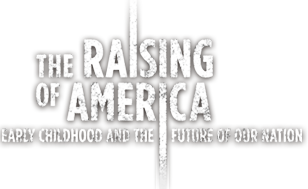The Raising of America
Signature Hour
to watch purchased videos
The U.S. is the wealthiest, most powerful country in the world. So why has our child well-being fallen to 26th? An alarming number of American children are following low developmental trajectories from the start. They enter adulthood with learning challenges, behavioral issues and even poor physical health.
But population health is not all that’s at risk, researchers argue. By under-investing in the vital years of early childhood we are also under-developing America.
The evidence confirms that providing all our children the opportunity for a strong start pays many dividends, not just for individuals but for the future prosperity, equity and well-being of the nation. What infants and toddlers need for a strong start is no mystery. A nurturing environment—safe, stable, and responsive—builds sturdy brain architecture, the foundation for future success in school and in life. The Raising of America interweaves discoveries from neuroscience with the stories of families and communities struggling to provide the nurturing environment all babies and young children need.
But too often parents find their efforts hindered by social and economic forces beyond their control: stagnant wages and job insecurity, lack of paid parental and family leave, childcare that is both poor quality and financially out of reach, racial stigma and social exclusion.
This growing squeeze for time, money and resources has made American middle-class life increasingly precarious. And when parents are squeezed, their children pay the price. A 20-year Wisconsin study shows that stressors on parents when their children are infants and toddlers increase the risk of those children growing up with a hyper-reactive fight-or-flight
stress response. The personal and social costs? More emotional, behavior, substance abuse and learning problems later in life, even chronic disease.
Those suffering the most risks, however, are the one in four children born into poverty. Their parents confess feeling fearful and guilty they won’t be able provide what their children need in our fend-for-yourself society. Pediatrician Renée Boynton-Jarrett asks: Is this what we’ve decided as society, that this degree of tension, these complex trade-offs are the norm, to be expected, just a part of raising a child?
It doesn’t have to be this way. We all benefit when we as a society better assure the conditions all children need for a strong start and the opportunity to realize their potential. Pre-school teacher Aiyauna Terry, embracing her young students, puts the challenge this way: This is the future right here. Invest in them. Invest in their parents. If you want America to get back on top, invest in these children now. They’re not going to fail you, but we can’t fail them now.
The fate of the nation may hang in the balance.


